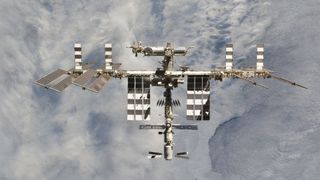
the international space station as photographed while looking down at Earth
(Image credit: NASA)
NASA and Russia have agreed to keep launching American astronauts and Russian cosmonauts on each other’s spacecraft, media reports suggest.
Roscosmos announced both it and NASA will continue the International Space Station launches with each other’s crew members through at least 2025, “to maintain the reliability of the ISS as a whole,” according to multiple reports including the Moscow Times.
Space.com has reached out to NASA officials for comment. NASA and Roscosmos have an existing agreement to launch crew members on each other’s spacecraft, to allow for independent launch access for both nations and backup in case of trouble. Right now the manifest includes SpaceX Dragon for NASA missions, and Soyuz for Russia. (When Boeing Starliner is ready, presumably it will be included too for U.S. missions.)
The ISS is manifested to last until at least 2030, as most of the international coalition has agreed to stick with it. Russia will remain until 2028 or so, based on the most recent reports; the country is working on a different set of space plans in the future.
Related: NASA working to get private space stations up and running before ISS retires in 2030
Though NASA and Russia are the chief ISS partners alongside the European Space Agency, Japan and Canada, relations changed in 2022 when Russia invaded Ukraine to the condemnation of most of the world. Most space partnerships were severed with Russia aside from the ISS, which remains for space policy reasons.
Russia and NASA operate different segments of the space station with different operational responsibilities. They also send up cargo ships for resupply missions and interface with the crew in independent mission controls.
Since 2022, Russia has teamed up with China to launch a moon-facing alliance. NASA also has its own group, under the Artemis Accords, a coalition of 30-plus nations that themselves promise peaceful space exploration norms with a subset of countries also participating in moon exploration.
The Artemis Accords aim to put astronauts on the moon no earlier than 2025 with Artemis 3, and have already launched Artemis 1 (uncrewed) in 2022 around the moon. Artemis 2, with four astronauts on board, should launch around the moon in 2024 or so.
Join our Space Forums to keep talking space on the latest missions, night sky and more! And if you have a news tip, correction or comment, let us know at: [email protected].
Breaking space news, the latest updates on rocket launches, skywatching events and more!
Elizabeth Howell (she/her), Ph.D., is a staff writer in the spaceflight channel since 2022 covering diversity, education and gaming as well. She was contributing writer for Space.com for 10 years before joining full-time. Elizabeth’s reporting includes multiple exclusives with the White House and Office of the Vice-President of the United States, an exclusive conversation with aspiring space tourist (and NSYNC bassist) Lance Bass, speaking several times with the International Space Station, witnessing five human spaceflight launches on two continents, flying parabolic, working inside a spacesuit, and participating in a simulated Mars mission. Her latest book, “Why Am I Taller?”, is co-written with astronaut Dave Williams. Elizabeth holds a Ph.D. and M.Sc. in Space Studies from the University of North Dakota, a Bachelor of Journalism from Canada’s Carleton University and a Bachelor of History from Canada’s Athabasca University. Elizabeth is also a post-secondary instructor in communications and science at several institutions since 2015; her experience includes developing and teaching an astronomy course at Canada’s Algonquin College (with Indigenous content as well) to more than 1,000 students since 2020. Elizabeth first got interested in space after watching the movie Apollo 13 in 1996, and still wants to be an astronaut someday. Mastodon: https://qoto.org/@howellspace
>>> Read full article>>>
Copyright for syndicated content belongs to the linked Source : Space.com – https://www.space.com/nasa-russia-astronaut-launches-iss-2025










